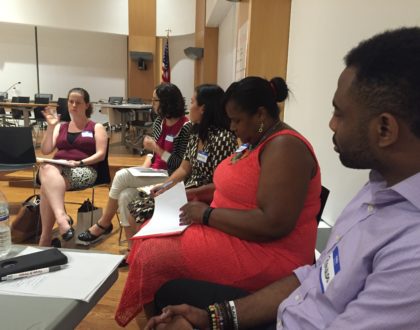Tackling Racism in the Boston Public Schools: Moving from Talk to Action

Guest blog post by Susan Naimark.
Kids are making sense of race long before they enter the doors of the school…they need to know about acts of resistance…and we adults are modeling what can be done about racism.
Seventy participants who showed up for this forum did not need to be reminded of the continuing racial inequities that persist in the Boston Public Schools. They came ready to talk about resistance and action. The racially diverse group was hungry for dialogue, bridging differences, and exploring various ways to address racism in the schools.
The evening opened with a sober reminder delivered by long-time education activist Susan Naimark: Boston’s black community has been organizing since 1798 to address lack of consistent quality and adequate resources for the education of black children. Numerous petitions to address these inequities over a period of nearly 200 years were routinely denied by the Boston School Committee. Naimark pointed out how this has led to a deeply embedded culture of racism that is not so easy to dislodge, despite the best intentions of many people working from inside and outside of the system.
A stellar panel of activists focused on three pathways to action: talking with your children about race and racism, working within a school to address racism, and organizing at the system-wide, institutional level. Audience members then had the opportunity to go deeper in small groups with these topics.
“Our actions are more important than words” for teaching children about race and racism. Andrew Grant-Thomas, a co-founder of EmbraceRace, emphasized how adults need to do our own homework in order to best teach kids about race and the realities of racism. For white parents in particular, he cautioned, the worst thing is to shut down conversations about race. Keondre McClay, a Boston high school student, encouraged the audience to “be real about racism, tell the truth to kids.” He shared how too many of his peers don’t understand racism as an institution, and adults have a critical role in teaching this to our young people.
Erin Bothwick, principal of the Mozart Elementary School, advised that the work of dismantling racism in her school needs to be done “consciously and constantly.” As a school leader, she had to listen to the racist experiences of parents and students of color in her school, as difficult as that was for her, in order to create a sense of urgency. Now, there’s no looking back, even as she realizes this is unchartered territory for her, and long-term work. Gloria West, BPS parent and long-time community activist, encouraged everybody to bring a friend along in their activism. This is how to grow our impact. We all need to get more people to say “enough is enough!” rather than waiting for someone else to do the work.
Nia Evans of the Boston NAACP identified four ways that institutional racism shows up in the Boston Public Schools: through policy, culture, information dissemination, and data collection: “What is measured is what we pay attention to.” She went on to share examples of organizing efforts to address a range of critical issues across all four levels, including school discipline; teacher diversity, evaluation and cultural competency; school finances; and voice. The voices of those most impacted by inequities must be heard for solutions to be effective and sustainable.
The hunger to work across racial differences showed up in the room side-by-side with its challenges. Early in the evening’s program, a participant of color pressed the audience on what happens after the feel good part of showing up at events like this:
“I’m tired of teaching white people how to treat us.”
Her honesty and frustration raised the heat in the room, as it highlighted the divergent experiences and needs of white people and people of color. Engaging around these tense moments are as much a part of doing the work of challenging racism as the action organizing.
The forum was organized by YW Boston in partnership with Community Change, Inc. and with support from Third Sector New England.
Review resources for further information and action from this event.

